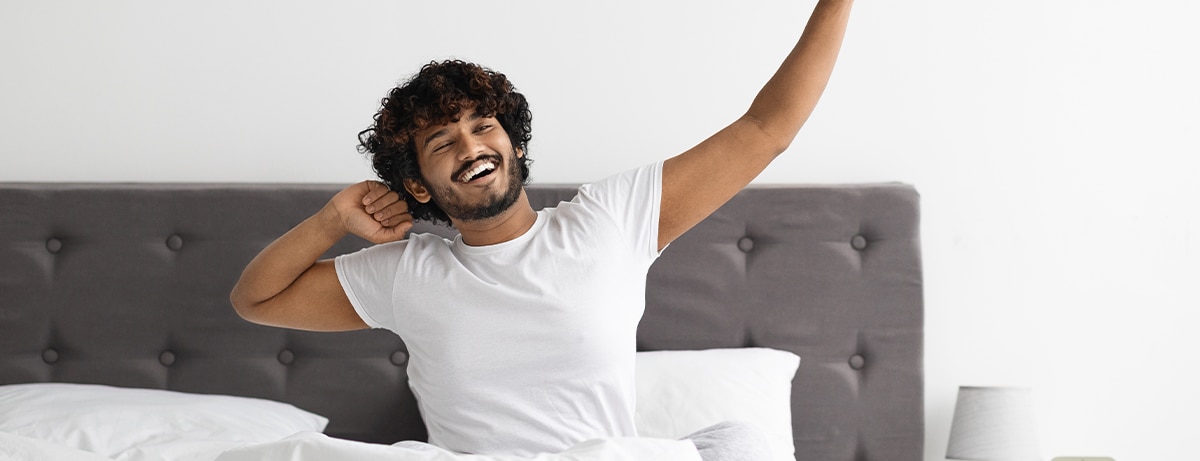20% off £30
We answer your most Googled questions on sleep

Sleep is an integral part of life, so much so that did you know we spend a third of our lives asleep? Sleep allows our bodies to heal, support healthy brain function and maintain physical health. Read on as we respond to your most Googled sleep questions below.
1. How to sleep in the summer heat?
Ensuring you get restful sleep when the warmer weather comes around can be difficult. However, even something as simple as swapping to a lower tog, thinner duvet could aid better sleep through higher temperatures, or taking up an ice-cold bottle of water to bed.
And there’s more! We’ve collected 6 useful tips on how to keep cool at night and through summer:

- Keep the blinds closed during the day
- Use a dehumidifier and a fan
- Have a cool shower before tucking yourself in
- Go ahead, sleep naked
- Try a cooling mattress
- Avoid vigorous exercise, heavy meals, and lots of alcohol 4 hours before bed1
2. Why is it harder to sleep in the summer?
Sleeping during the summertime can be harder for a lot of reasons than just the heat alone.
SleepScore Labs’ applied sleep scientist Elie Gottlieb, Ph.D., proposes that getting more light outdoors during the summer may trick our brains into thinking it’s still daytime. This can cause a shift back in our circadian rhythms, pushing us to go to bed and wake up later during the summer months.2
Running in the background to carry out essential functions and processes, circadian rhythms are 24-hour cycles that are part of the body’s internal clock. One of the most important and well-known circadian rhythms is the sleep-wake cycle.3
3. Why is sleep important for mental health?
Poor sleep can affect your mental and physical health.
Sleep can affect your emotional regulation. If you’re experiencing a period of bad sleep for weeks, months or years, this can affect your day-to-day life.4
If you're having problems sleeping, you might experience feelings of:
- Anxiety, depression, low mood or loneliness
- Be more likely to have psychotic episodes, as poor sleep can trigger mania, psychosis or paranoia (or make existing symptoms worse)
- Struggle to concentrate, or make plans and decisions
- Irritableness or not having the energy to do things
- Experience problems with day-to-day life, i.e., at work or with family and friends
- Be more affected by other health problems, including other mental health problems5
Ensuring you maintain adequate sleep allows the body and brain to function properly and remain it’s healthiest.
4. Does sleep training work?
Sleep training is usually what parents use to train their children to sleep through the night. But did you know that adults can sleep train themselves?
Cognitive Behavioural Therapy (CBT) can be used as a therapeutic approach to sleep training. CBT sleep training will teach you how to break bad sleeping habits in order to prepare your mind and body for a good night's sleep. This can help to prevent depression in older adults with insomnia, according to a new clinical trial.6
5. How does sleep affect physical health?
Sleep isn’t just essential for the brain.
Dr. Michael Twery, a sleep expert at NIH, suggests sleep affects almost every tissue in our bodies, including growth and stress hormones, our immune system, appetite, breathing, blood pressure and cardiovascular health.6
6. Can sleep improve memory?

6. Can sleep improve memory?
7. Is it better to sleep with a pillow or without?
Sleeping with or without pillows often comes down to personal preference. But what is best for us?
Sleeping without pillows can help your back extend, allowing your body to rest in a natural position without any consequences or aches.
Pillows that are too soft can strain your neck muscles and even decrease the blood flow to your head. Because of this, you might wake up in the morning feeling light-headed or with a headache.
Using a thick pillow or stacking a couple of pillows underneath your head and neck can deform your position of the spine and induce pain in your back. Sleeping like this for long periods will cause chronic back pain and frequent muscle strain.
Not every sleeping position will feel as comfortable without a pillow, especially if you have existing neck injuries. The benefits may outweigh the initial discomfort for some, though for others it might not be the right choice.8
8. What is the healthiest amount of sleep to get?
- Infants 4 months to 12 months need 12 - 16 hours per 24 hours, including naps
- 1 to 2 years need 11- 14 hours per 24 hours, including naps
- 3 to 5 years need 10 - 13 hours per 24 hours, including naps
- 6 to 12 years need 9 - 12 hours per 24 hours
- 13 to 18 years need 8 - 10 hours per 24 hours Adults need 7 or more hours a night9
9. What is the best posture for sleep?
The Sleep Foundation suggests that the best sleep position is one that promotes healthy spinal alignment from your hips all the way to your head.
Though, there are some positions that are considered healthier than others. Sleeping on your side or back is considered more beneficial than sleeping on your stomach - as it’s easier to keep your spine supported and balanced. Making sure your spine is supported relieves pressure on the spinal tissues and allows your muscles to relax and recover.
This being said, if sleeping on your stomach feels good to you, you could minimize your risk of pain and improve your spinal alignment with the right mattress and pillow.10
10. How to get the highest quality sleep?
How we prefer to unwind and fall asleep is individual to all, however obtaining the highest quality sleep can come down to serval factors. The suggestions below could help to promote a better night’s sleep:
- Take time to relax
- Get into a routine
- Avoid technology
- Create a restful environment
- Don’t clock watch
- Foods that aid sleep vs foods to avoid
- Darkness promotes sleep
- Keep fit and get active
- Focus on sleep quality11
The final say
That concludes our answers to your most commonly Googled questions on sleep. We hope to have cleared up some of your queries and passed on some helpful tips. Sleep deprivation is something we should all try to avoid, though the warmer weather can often make this quite difficult… For more information on sleep, check out 21 sleep habits: Tips for morning, day & night over on our Health Hub. If you feel like you’re struggling with the effects of poor sleep, then it’s worth speaking to your GP.
- https://www.everydayhealth.com/sleep/tips-for-sleeping-in-summer-heat-and-humidity/
- https://www.sleep.com/sleep-health/summer-effect-on-sleep#:~:text=According%20to%20SleepScore%20Labs'%20applied,later%20during%20the%20summer%20months
- https://www.sleepfoundation.org/circadian-rhythm https://mentalhealth-uk.org/help-and-information/sleep/
- https://www.mind.org.uk/information-support/types-of-mental-health-problems/sleep-problems/about-sleep-and-mental-health/
- https://info.ancsleep.com/blog/5-common-causes-of-insomnia-1-1-0#:~:text=Sleep%20training%20is%20what%20adults,it%20has%20on%20depression%20prevention
- https://newsinhealth.nih.gov/2013/04/benefits-slumber#:~:text=%E2%80%9CSleep%20affects%20almost%20every%20tissue,obesity%2C%20heart%20disease%20and%20infections
- https://newsinhealth.nih.gov/2013/04/sleep-it#:~:text=%E2%80%9CDuring%20a%20night%20of%20sleep,the%20deep%20stages%20of%20sleep
- https://www.sleepadvisor.org/sleep-with-or-without-a-pillow/
- https://www.mayoclinic.org/healthy-lifestyle/adult-health/expert-answers/how-many-hours-of-sleep-are-enough/faq-20057898
- https://www.sleepfoundation.org/sleeping-positions#:~:text=Specifically%2C%20sleeping%20on%20the%20side,muscles%20to%20relax%20and%20recover
- https://www.bhf.org.uk/informationsupport/heart-matters-magazine/wellbeing/sleeping-tips
Please note that the information in this article is only top-level guidance, and if you’re experiencing symptoms it may be worth checking in with a medical professional for personalised advice.















